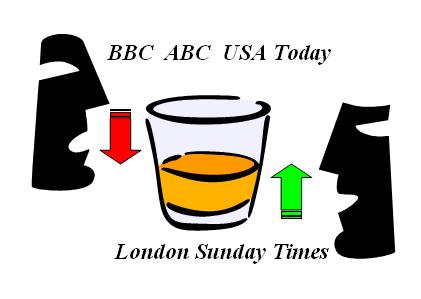
Two polls have come out recently that both claim to reflect the feelings of Iraqis about the current conditions and propsects in Iraq. One poll, of 5000 Iraqis done for the London Sunday Times, finds that the majority of Iraqis think that the current security opeations in Baghdad (aka, "the Surge") are likely to work and tha respondents are generally hopeful about the prospects for their country. (See Iraqis: Life is Getting Better.)
The other poll, of over 2000 Iraqis commissioned by the BBC, ABC and USA Today, finds by similar margins that the majority of Iraqis think conditions suck. (see Pessimism Growing Among Iraqis.)
Quite a bit of the disparity between the two surveys can be explained by observing that the results are not that different, actually. The headlines diverge wildly but, if you read the actual stories you will find that the Times found large numbers of Iraqis who were very unhappy with their current situation but still hopeful, while the BBC found Iraqis to be somewhat hopeful in the long term but very cranky about their current situation. In general, the BBC/ABC survey tends to be slightly more negative, from the coalition point of view, and news outlets that like to write negative headlines will tend to select that survey and view it in the most depressing light possible. The Times survey, with its slightly more encouraging results, is quoted by organizations that like to present a positive view of the war in Iraq. Needless to say, despite the Times' survey's two and a half times bigger sample size, the BBC/ABC survey is much more widely reported.
The rest of the disparity is likely to arise from the wording of the questions on the respective surveys. My take is that Iraqis are, on average, somewhat hopeful about the future of the country but are also painfully aware that the current conditions stink. This makes it easy to get any results you want from a survey. If you tilt the questions to get them to think about the larger context -- where they have come from and where they are going -- they will sound hopeful. Saddam is gone and things might work out OK. But, if you encourage them to think about their current irritations you can get them to vent.
I think Mohammad Fadhil, from the Iraq the Model blog, expressed the sense of this odd Iraqi hopefulness when he wrote --
You look around in Baghdad now and see hundreds of men working in the streets to pick up garbage; to plant flowers and paint the blast walls in joyful colors. Many of Baghdad’s squares are becoming green and clean. The picture isn’t perfect, but it’s a clear attempt to beat violence and ease pain through giving the spring a chance to shine.Blast walls painted in joyful colors and the soothing rumble of armor and the thump of big guns at night: I can sympathize with the BBC for not recognizing this as what they would call "hope" but I am glad that it will serve as such for Mohammed and a slight majority of his fellow Iraqis. With any luck at all we can trade it in for a better variety of hope in the future. Or at least that is what I hope.
Nights in Baghdad now are far from quiet, but the sounds cause less anxiety for me than they did before. I recognize the rumble of armor and thump of guns and they assure me that the gangs and militias do not dominate the night as they once did.

No comments:
Post a Comment